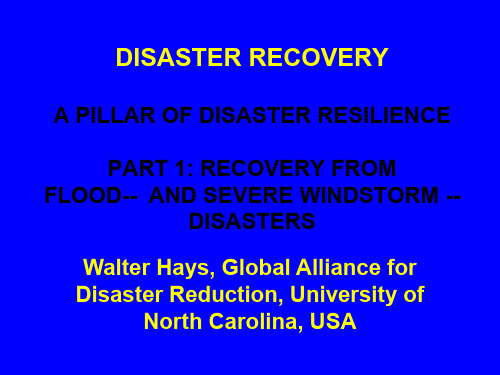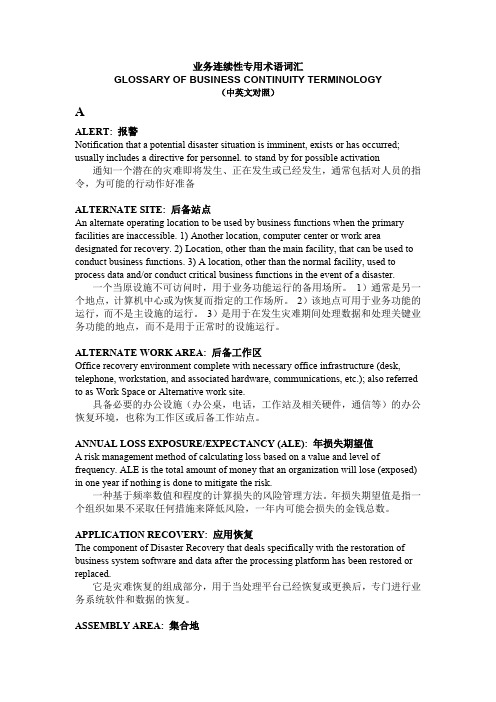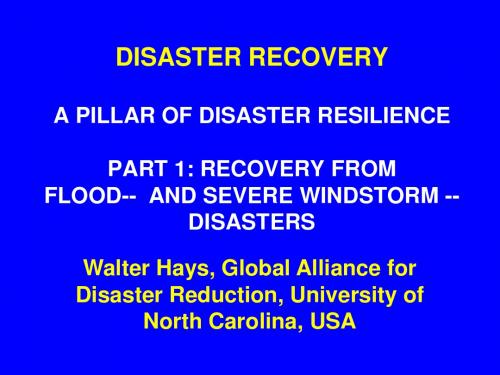Exercising Disaster Recovery
- 格式:ppt
- 大小:436.00 KB
- 文档页数:31



中科同向云备份数据柜白皮书目录前言 (3)文档适用范围 (3)术语定义 (3)一、云备份数据柜介绍 (9)1.1技术简介 (9)1.2功能简介 (9)1.3技术原理 (10)二、用于数据容灾的中科同向云备份数据柜 (13)2.1产品简介 (13)2.2产品模块 (13)管理控制台 (13)客户端 (14)介质服务器 (14)三、应用容灾的典型部署方式 (15)3.1支持平台和应用范围 (16)平台支持 (16)应用支持 (16)四、亮点功能概览 (17)4.1内置高效数据备份 (17)4.2内置的实时复制 (17)4.3内置的灾难恢复 (17)4.4内置虚拟化容灾方案 (18)4.5内置的重复数据删除 (19)4.6内置的灾难恢复演习 (19)4.7基于级联复制的远程应用容灾 (20)4.8智能的版本合成 (20)4.9更迅速的时间点恢复 (21)4.10丰富的网络传输控制 (21)五、关键技术剖析 (21)5.1数据库实时复制技术 (21)5.2数据库一致性技术 (21)5.3接管数据一致性技术 (22)5.4重复数据删除技术 (23)5.5Seldata 恢复技术 (23)前言中科同向云备份数据柜是一种业务可持续性、云存储、云备份的容灾平台,可保证业务系统在发生灾难后可持续对外提供服务。
整个平台的可持续性关键指标包括数据丢失量最小(RPO)和灾难恢复时间最小(RTO)。
中科同向云备份数据柜采用云计算模式,基于持续数据保护(CDP)技术,内置数据备份、灾难恢复和数据归档、网络存储模块,可实现应用系统的实时备份、本地高可用、一体化集成保护、异地数据持续性容灾等方案。
文档适用范围此文档适用于以下产品线:中科同向云备份数据柜术语定义恢复点目标(Recovery Point Objective)RPO 是以时间为单位,即在灾难发生时,系统和数据必须恢复到的时间点要求。
RPO 标志系统能够容忍的最大数据丢失量。

业务连续性专用术语词汇GLOSSARY OF BUSINESS CONTINUITY TERMINOLOGY(中英文对照)AALERT: 报警Notification that a potential disaster situation is imminent, exists or has occurred; usually includes a directive for personnel. to stand by for possible activation 通知一个潜在的灾难即将发生、正在发生或已经发生,通常包括对人员的指令,为可能的行动作好准备ALTERNATE SITE: 后备站点An alternate operating location to be used by business functions when the primary facilities are inaccessible. 1) Another location, computer center or work area designated for recovery. 2) Location, other than the main facility, that can be used to conduct business functions. 3) A location, other than the normal facility, used to process data and/or conduct critical business functions in the event of a disaster.一个当原设施不可访问时,用于业务功能运行的备用场所。
1)通常是另一个地点,计算机中心或为恢复而指定的工作场所。
2)该地点可用于业务功能的运行,而不是主设施的运行。
3)是用于在发生灾难期间处理数据和处理关键业务功能的地点,而不是用于正常时的设施运行。


新视野大学英语第三册课文翻译Unit1 AMy brother, Jimmy, did not get enough oxygen during a difficult delivery, leaving him with brain damage, and two years later I was born. Since then, my life revolved around my brother’s. Accompanying my growing up was always “go out and play and take your brother with you”. I couldn’t go anywhere without him, so I urged the neighborhood kids to come to my house for some out-of-control kid-centered fun我哥哥吉米出生时遇上难产,因为缺氧导致大脑受损。
两年后,我出生了.从此以后,我的生活便围绕我哥哥转。
伴随我成长的,是“到外面去玩,把你哥哥也带上。
”不带上他,我是哪里也去不了的。
因此,我怂恿邻居的孩子到我家来,尽情地玩孩子们玩的游戏。
My mother taught Jimmy practical things like how to brush his teeth or put on belt. My father, a saint, simply held the house together with his patience and understanding.I was in charge outside where I administered justice by tracking down the parents of the kids who picked on my brother, and telling on them.我母亲教吉米学习日常自理,比如刷牙或系皮带什么的.我父亲宅心仁厚,他的耐心和理解使一家人心贴着心。
有关企业的社会责任与担当的英语作文全文共3篇示例,供读者参考篇1Corporate Social Responsibility and Accountability: A Student's PerspectiveAs a student living in the modern age, I have grown increasingly aware of the significant role that corporations play in shaping our society and the world around us. These business entities, with their vast resources and global reach, wield immense power and influence. However, with great power comes great responsibility, and it is imperative that corporations recognize and embrace their social and ethical obligations.The concept of corporate social responsibility (CSR) has gained prominence in recent decades, highlighting the notion that companies should not solely focus on maximizing profits but also consider their impact on society, the environment, and various stakeholders. CSR encompasses a wide range of practices, including responsible labor practices, environmental stewardship, ethical business conduct, and community involvement.One of the most pressing issues surrounding corporate social responsibility is the treatment of employees. Corporations have a moral and ethical duty to provide fair wages, safe working conditions, and opportunities for growth and development. Unfortunately, numerous cases of labor exploitation, sweatshop practices, and inadequate worker protections have tarnished the reputation of many companies, particularly those operating in developing nations. It is crucial that corporations prioritize the well-being of their workforce, not only for ethical reasons but also because a motivated and valued workforce contributes to long-term business success.Environmental sustainability is another critical aspect of corporate social responsibility. The impact of human activities on the planet has become increasingly apparent, with issues such as climate change, resource depletion, and pollution posing severe threats to our collective future. Corporations, as major contributors to these environmental challenges, must take decisive action to reduce their ecological footprint. This can involve adopting clean and renewable energy sources, implementing waste reduction and recycling initiatives, and investing in environmentally friendly technologies and practices.Furthermore, corporations must uphold ethical business practices and maintain transparency in their operations. Engaging in corruption, bribery, or other unethical conduct not only undermines the integrity of the company but also erodes public trust and harms the broader society. Companies should strive for transparency in their financial reporting, supply chain management, and decision-making processes, allowing stakeholders to hold them accountable.Beyond these core responsibilities, corporations can also make a positive impact by actively engaging in philanthropic and community development initiatives. Supporting local educational programs, funding healthcare initiatives, and contributing to disaster relief efforts are just a few examples of how companies can give back to the communities in which they operate. Such efforts not only benefit society篇2Corporate Social Responsibility and Accountability: A Call for Ethical Business PracticesAs a student navigating the complexities of today's business landscape, I find myself increasingly concerned about the role corporations play in shaping our society. While the pursuit ofprofit has long been the driving force behind many business endeavors, we must acknowledge that corporations wield immense power and influence, impacting not only their shareholders but also the communities they operate in and the planet we call home.The concept of corporate social responsibility (CSR) has gained significant traction in recent years, recognizing that businesses have a moral and ethical obligation to consider their impact on society and the environment. However, mere lip service to CSR is not enough; true accountability and tangible actions are paramount.At its core, CSR should be rooted in a genuine commitment to ethical practices that prioritize the well-being of stakeholders, including employees, consumers, and the broader community. This encompasses fair labor practices, responsible supply chain management, environmental stewardship, and a dedication to transparency and good governance.One of the most pressing issues in the realm of CSR is the treatment of workers. Far too often, we hear harrowing tales of exploitative labor conditions, unfair wages, and a blatant disregard for basic human rights. It is incumbent upon corporations to ensure that their employees, as well as thoseemployed by their suppliers and partners, are treated with dignity and respect. Fair compensation, safe working environments, and opportunities for growth and development should be non-negotiable standards.Moreover, corporations must take active steps to minimize their environmental footprint and contribute to the global efforts to combat climate change. The relentless pursuit of profit at the expense of our planet's well-being is not only short-sighted but also a grave threat to our collective future. Embracing sustainable practices, investing in renewable energy sources, and adopting circular economy principles should be prioritized as critical components of CSR strategies.Beyond environmental concerns, corporations also bear a responsibility to uplift the communities in which they operate. This can manifest in various forms, such as supporting local initiatives, investing in educational programs, and contributing to infrastructure development. By actively engaging with and empowering local communities, corporations can foster goodwill, strengthen their social license to operate, and create shared value.Underpinning all these efforts should be a commitment to transparency and accountability. Corporations must be willing toopenly disclose their practices, engage in meaningful stakeholder dialogue, and be held accountable for their actions. Greenwashing and empty promises are no longer acceptable; tangible progress and measurable impact should be the benchmarks against which corporations are evaluated.As future business leaders and decision-makers, we have a profound responsibility to reshape the narrative surrounding corporate social responsibility. We must challenge the notion that profit maximization should come at the expense of ethical considerations and societal well-being. Instead, we should embrace a mindset that recognizes the interdependence between business success and the health of our communities and planet.Integrating CSR principles into business education is crucial in cultivating a generation of leaders who are equipped to navigate the complex landscape of ethical decision-making. By exposing students to case studies, best practices, and thereal-world implications of corporate actions, we can instill a deeper understanding of the importance of responsible and sustainable business practices.Furthermore, we must actively engage with corporations, holding them accountable for their actions and demandinggreater transparency and accountability. By exercising our collective voice as consumers, investors, and members of society, we can exert pressure on companies to prioritize ethical considerations and align their practices with the greater good.Ultimately, the pursuit of corporate social responsibility and accountability is not merely a noble endeavor; it is a moral imperative in an increasingly interconnected andresource-constrained world. By embracing ethical business practices, corporations can not only mitigate their negative impacts but also contribute positively to the well-being of society and the planet.As students and future leaders, it is our duty to challenge the status quo, to question the practices that prioritize short-term gains over long-term sustainability, and to advocate for a more responsible and accountable business ecosystem. Only by holding corporations to higher standards and demanding genuine commitment to ethical and sustainable practices can we create a world where business success is harmoniously intertwined with social and environmental progress.In conclusion, corporate social responsibility and accountability are not mere buzzwords or marketing ploys; they represent a fundamental shift in how we perceive the role ofbusinesses in our society. By embracing ethical practices, prioritizing stakeholder well-being, and demonstrating a genuine commitment to environmental stewardship and community empowerment, corporations can not only enhance their reputation but also contribute to the creation of a more just, equitable, and sustainable world. It is up to us, as students and future leaders, to shape this narrative and ensure that the pursuit of profit is aligned with the greater good.篇3Corporate Social Responsibility and Accountability: An Imperative for BusinessesIn today's increasingly interconnected world, the role and impact of corporations extend far beyond their balance sheets and profit margins. As students pursuing careers in various fields, it is crucial for us to understand the concept of corporate social responsibility (CSR) and the accountability that comes with it. Businesses are no longer isolated entities solely focused on maximizing shareholder wealth; they are integral components of the communities they operate in and have a profound influence on the lives of countless individuals.At its core, corporate social responsibility encompasses the ethical and sustainable practices that companies adopt to address their environmental, social, and economic impacts. It is a recognition that businesses are not merely profit-driven machines but also moral agents with obligations to society. By embracing CSR, companies can contribute to the greater good, foster positive change, and build trust with their stakeholders, including customers, employees, and the communities they serve.One of the most pressing issues that businesses must tackle is environmental sustainability. The consequences of climate change, resource depletion, and pollution are becoming increasingly evident, and corporations have a significant role to play in mitigating these challenges. Responsible companies are adopting eco-friendly practices, such as reducing their carbon footprint, implementing energy-efficient processes, and embracing circular economy models that minimize waste and promote recycling.Beyond environmental concerns, CSR also encompasses social and humanitarian aspects. Companies that prioritize social responsibility strive to uphold human rights, provide fair labor practices, and contribute to the development of localcommunities. This can involve initiatives such as supporting educational programs, investing in healthcare facilities, and promoting gender equality and diversity within their workforce.Furthermore, corporate accountability is intrinsically linked to social responsibility. Companies must be transparent about their operations, ethical conduct, and the impacts they have on society. This transparency fosters trust and allows stakeholders to hold businesses accountable for their actions. Regular reporting, third-party audits, and open dialogue with communities and advocacy groups are essential components of corporate accountability.It is important to note that embracing CSR and accountability is not merely a matter of altruism or public relations; it is a strategic imperative for businesses in the long run. Companies that prioritize sustainability and social responsibility are often better positioned to attract and retain top talent, build customer loyalty, and maintain a positive reputation. Moreover, by proactively addressing societal challenges, businesses can mitigate risks, enhance their resilience, and capitalize on opportunities in emerging markets and sectors.As students, we have the opportunity to shape the future of business practices. By studying and understanding the principles of corporate social responsibility and accountability, we can prepare ourselves to become ethical and socially conscious leaders in our respective fields. Whether we pursue careers in finance, marketing, operations, or any other domain, we can advocate for responsible and sustainable practices within our organizations.Moreover, as consumers and citizens, we have the power to influence corporate behavior through our choices and collective voice. By supporting companies that prioritize CSR and holding those that fall short accountable, we can drive positive change and create a business landscape that prioritizes not only profit but also ethical and sustainable practices.In conclusion, corporate social responsibility and accountability are no longer optional pursuits for businesses; they are fundamental imperatives in today's interconnected and socially conscious world. As future professionals and leaders, it is our responsibility to understand and champion these concepts, ensuring that businesses contribute positively to society while maintaining ethical and sustainable practices. By embracing CSR and accountability, we can create a future where corporationsare not only drivers of economic growth but also catalysts for positive social and environmental change.。
第十章恢复重建理论 (1)第一节灾后恢复重建概述 (1)第二节最小补偿投资 (2)第三节灾后恢复重建索洛模型 (10)第十章恢复重建理论第一节灾后恢复重建概述一、恢复的概念恢复是由英文单词recovery翻译而来,从其基本过程来看,相当于汉语中的恢复重建。
国际减灾战略(ISDR)把恢复定义为:复原并尽可能地改进受灾害影响社区的设施、生计和生存条件,包括努力减轻与灾害风险有关的因素。
美国在《全国突发事件管理系统》中,对恢复的释义是:“制定、协调和实施服务和现场复原预案,重建政府运转和服务功能,实施对个人、私人部门、非政府和公共的援助项目以提供住房和促进复原,对受影响的人们提供长期的关爱和治疗,以及实施社会、政治、环境和经济恢复的其它措施,评估突发事件以汲取教训,完成事件报告,主动采取措施减轻未来突发事件的后果。
总结美国的恢复概念,就是对遭到突发事件破坏的服务设施和现场按照预案复原,对受影响的个人和组织实施援助项目。
恢复的内容不仅包括各种设施,也包括经济、环境、甚至心理状态。
具体来说,恢复包括针对灾难造成的物质和社会两个层面的损失。
物质层面有:基础设施的破坏,企业财产损失、家庭财产损失等等;社会层面有:人员伤亡、经济破坏、心理创伤、环境破坏等等。
但是,并不是每一个层面的每一项损失都是能够弥补或恢复的,比如人员伤亡;即使能够恢复的方面和内容,也不一定能够恢复到灾前的程度,比如经济状况。
二、恢复的类别美国公共安全管理部门根据恢复行动的作用将恢复分为短期和长期两类。
每一类恢复都有各自不同的内容。
(1)短期恢复在应急响应过程中,应对者必须采取一些紧急措施,恢复受到破坏各种机构和设施的基本功能,并且采取保护措施,避免对它们造成进一步的破坏,这些行动就是短期恢复行动,这些行动过程就是短期恢复。
在应急管理周期的四个阶段中,短期恢复同应对有所重叠,有时候二者难以截然分开。
一般来说,应对侧重的是救援,短期恢复侧重的是对设施功能的恢复。
大学生需要承担哪些社会责任英语作文Here is an essay on the topic "Social Responsibilities of University Students" with a word count greater than 1000 words, written in English without any additional title or punctuation marks.University students play a crucial role in shaping the future of our society. As they embark on their academic journey, they not only acquire knowledge but also develop a sense of social responsibility. The responsibilities that university students must embrace extend beyond the confines of the classroom and encompass a wide range of domains that have a profound impact on their communities and the world at large.One of the primary social responsibilities of university students is to contribute to the betterment of their local communities. This can be achieved through active involvement in community service initiatives that address pressing social issues. Whether it is volunteering at a local soup kitchen, organizing beach cleanups, or tutoring underprivileged children, university students have the opportunity to make a tangible difference in the lives of those around them. By engaging in such activities, they not only develop a deeper understanding of the challenges faced by their community but alsocultivate a sense of empathy and civic engagement.Moreover, university students have a responsibility to promote environmental sustainability. As the leaders of tomorrow, they must take an active role in addressing the pressing environmental challenges that our planet faces. This can involve participating in campus-wide initiatives to reduce waste, promote recycling, and advocate for the use of renewable energy sources. Additionally, university students can leverage their academic knowledge and research skills to develop innovative solutions to environmental problems, contributing to the development of a more sustainable future.Another significant social responsibility of university students is to foster diversity, equity, and inclusion within their institutions and beyond. By actively engaging in discussions and initiatives that promote understanding and respect for different cultures, ethnicities, and identities, university students can play a crucial role in creating more inclusive and equitable societies. This may involve organizing cultural events, participating in diversity workshops, or advocating for the implementation of inclusive policies and practices on campus.Furthermore, university students have a responsibility to engage in civic participation and political discourse. As future leaders and decision-makers, they must develop a deep understanding of thepolitical and social issues that shape their communities and the world. This can involve attending town hall meetings, engaging with local and national policymakers, and staying informed on current events. By exercising their right to vote and actively participating in the democratic process, university students can influence the decisions that impact their lives and the lives of those around them.Beyond these local and national responsibilities, university students also have a global perspective to consider. In an increasingly interconnected world, they must recognize their role in addressing international challenges, such as global health crises, humanitarian emergencies, and climate change. This may involve fundraising for disaster relief efforts, volunteering with international organizations, or participating in study abroad programs that foster cross-cultural understanding and cooperation.In addition to these external responsibilities, university students also have a responsibility to themselves and their personal development. This includes prioritizing their mental and physical well-being, cultivating a love for lifelong learning, and developing the critical thinking and problem-solving skills necessary to navigate the complexities of the modern world. By investing in their own growth and well-being, university students can become better equipped to fulfill their social responsibilities and make meaningful contributions to society.In conclusion, the social responsibilities of university students are multifaceted and far-reaching. From contributing to their local communities to addressing global challenges, university students have the power to shape the world around them. By embracing these responsibilities and actively engaging in their communities, university students can not only enhance their own personal growth but also make a lasting impact on the world they will inherit.。